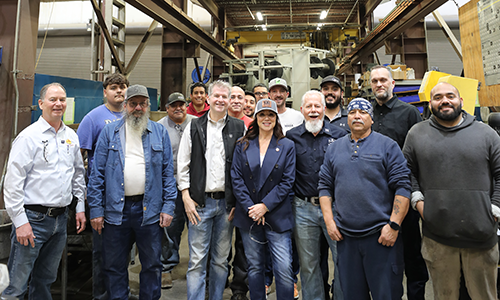To say that the 2025 Texas Legislative Session was the most impactful session ever for workforce issues in the state is an understatement.
While Texas’ state legislative session is biennial with legislators focusing on significant competing issues, lawmakers in Austin put their best effort forward when it came to workforce issues, looking to keep Texas the largest manufacturing state in the country. The 2025 legislative session in the Lone Star State saw multiple bills pass the legislature aimed at addressing skills training and providing a skilled trade workforce for the state’s manufacturers.
The following successful legislation was supported and backed by the by the AEM State Affairs Team:
Senate Joint Resolution 59 (SJR 59)
SJR 59 proposes a constitutional amendment to create funds supporting the capital needs of educational programs offered by the Texas State Technical College System, modernizing and expanding this system. If successful, this investment would help keep Texas a major hub for US manufacturing and give manufacturers located in Texas a great pool of skilled tradesmen and tradeswomen to hire from.
The resolution establishes the "permanent technical institution infrastructure fund" and the "available workforce education fund" as special funds in the state treasury, outside the general revenue fund. These funds are intended to provide a dedicated source of funding for capital projects and equipment purchases related to educational programs. The resolution also outlines the management and investment of the permanent fund by the comptroller.
Contingent on voter approval of the Constitutional Amendment, SB 1, the General Appropriations bill, appropriates $850 million from the general revenue fund to the comptroller of public accounts for deposit into the permanent fund.
After passing the legislature, SJR 59 now heads to the ballot for Texans to vote on this November.
HB 20 establishes the Applied Sciences Pathways Program, to be administered by the Commissioner of Education. The program would provide opportunities for students to concurrently earn high school diplomas and certificates from institutions of higher education in industries such as plumbing and pipe fitting, electrical, welding, sheet metal, diesel, and heavy equipment. Students will be able to use these certificate programs to obtain credits toward a high school diploma.
H.B. 120 will further expand career training opportunities in high schools by building upon existing, successful programs related to career and technology education and establishing new initiatives. Specifically, H.B. 120 improves or further funds the new instructional facility allotment and career and technology education, Rural Pathway Excellence Partnership Program (R-PEP), and Pathways in Technology Early College High School (P-TECH) programs. H.B. 120 also establishes the high school advising program and military pathway grant program.
HB 20 and HB 120 will help bridge a gap between Texas high schools and institutes of higher education for skilled workforce training in critical trades for the equipment manufacturing industry. Equipment manufacturers have expressed concerns that it is critical to start skills training in high school or before. HB 20 and HB 120 look to assist in moving higher education skills training from post-high school, directly into the current high school curriculum for those students who wish to seek a skilled trade. HB 20 was sent to the Governor on June 2 and HB 120 on June 1; both bills now await his signature.
Senate Bill 2448 (SB 2448)
Small rural communities are vital to the equipment manufacturing industry. SB 2448 adds to current law a rural workforce development program at the Texas Workforce Commission (TWC) to support measurable programs advancing college and career readiness, skill development, and work experience. The bill authorizes TWC to award grants for technical assistance to one or more nonprofit organizations to assist a rural community's alignment of workforce, higher education, and education goals, including access and attainment of postsecondary credentials and degrees. It also allows grants to local entities performing activities related to the program.
SB 2448 was signed into law by Governor Abbott on May 30, 2025.
To learn more about workforce issues in other states or to get involved in AEM’s advocacy efforts, please reach out to the AEM Advocacy Team at advocacy@aem.org.





